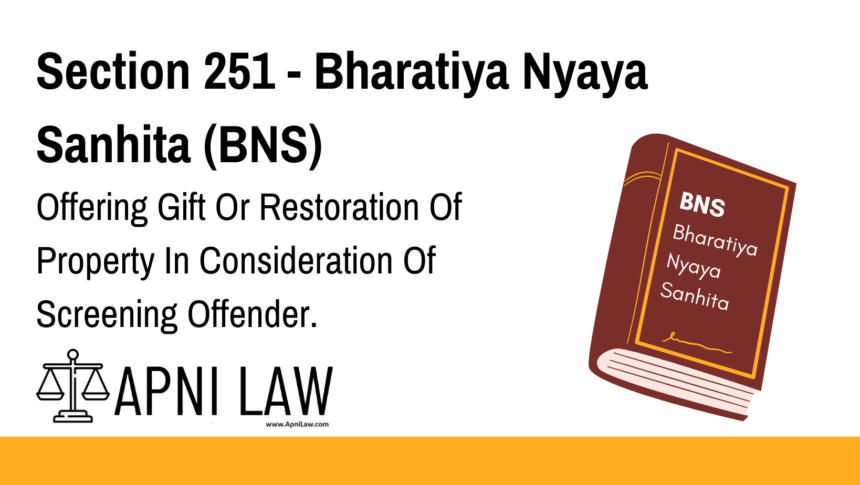Code: Section 251 BNS
Whoever gives or causes, or offers or agrees to give or cause, any gratification
to any person, or restores or causes the restoration of any property to any person, in
consideration of that person’s concealing an offence, or of his screening any person from
legal punishment for any offence, or of his not proceeding against any person for the
purpose of bringing him to legal punishment shall,––
(a) if the offence is punishable with death, be punished with imprisonment of
either description for a term which may extend to seven years, and shall also be
liable to fine;
(b) if the offence is punishable with imprisonment for life or with imprisonment
which may extend to ten years, be punished with imprisonment of either description
for a term which may extend to three years, and shall also be liable to fine;
(c) if the offence is punishable with imprisonment not extending to ten years,
be punished with imprisonment of the description provided for the offence for a
term which may extend to one-fourth part of the longest term of imprisonment
provided for the offence, or with fine, or with both.
Exception.—The provisions of this section and section 250 do not extend to any
case in which the offence may lawfully be compounded.
Explanation of Section 251 BNS
What Does Section 251 BNS Cover?
Section 251 BNS prohibits offering gifts, money, or property to influence or prevent someone from reporting a crime or from ensuring that an offender escapes legal consequences.
Key Elements of Section 251 BNS
- Giving or Restoring Property – The offender must give a gift or return property as a form of bribery.
- Consideration of Concealment – The act must be done to hide a crime or prevent an offender from punishment.
- Punishment Based on the Severity of the Concealed Offence –
- If the concealed offence is serious (death penalty/life imprisonment/10+ years in jail) → Up to 7 years imprisonment & fine.
- If the concealed offence is less serious (less than 10 years imprisonment) → Up to 3 years imprisonment & fine.
Illustrations
Example 1: A Businessman Bribes a Witness to Stay Silent
A businessman commits fraud and offers ₹10 lakh to a key witness to remain silent in court. Since the witness was bribed to screen the offender, the businessman can be punished under Section 251 BNS.
Example 2: A Person Returns Stolen Property to Avoid Punishment
X steals a valuable painting and later returns it to the owner in exchange for not reporting the crime. Since the return of property was meant to prevent legal action, X can be punished under Section 251 BNS.
Example 3: A Politician Pays Money to Prevent a Corruption Case
A politician facing corruption charges offers a large sum of money to law enforcement officials so they do not file a case against him. This act is punishable under Section 251 BNS.
Relation with Other Sections
- Section 250 BNS – Punishes accepting gifts or money to screen an offender.
- Section 239 BNS – Covers failing to report an offence despite legal duty.
- Section 248 BNS – Punishes false charges filed with malicious intent.
Common Questions and Answers on Section 251 BNS
1. What is the main objective of Section 251 BNS?
- To prevent bribery or manipulation that leads to criminals escaping justice.
2. What is the punishment under Section 251 BNS?
- Up to 7 years imprisonment & fine for serious offences (punishable by death/life imprisonment/10+ years).
- Up to 3 years imprisonment & fine for less serious offences (less than 10 years imprisonment).
3. Who can be punished under Section 251 BNS?
- Anyone who offers a bribe, gift, or property restoration in exchange for concealing a crime or protecting a criminal.
4. Is Section 251 BNS a cognizable offence?
- Yes, it is a cognizable offence, meaning police can arrest without prior approval from a magistrate.
Conclusion
Section 251 BNS ensures that no one can influence the justice system through gifts or bribes. It plays a crucial role in preventing criminals from escaping legal consequences and maintaining the integrity of law enforcement.
For more legal insights, visit ApniLaw today! 🚀








